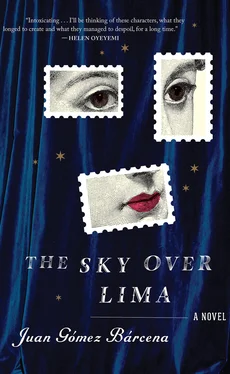Perhaps in keeping with this jovial spirit, the letters between Georgina and Juan Ramón are also breezy and light, like notes passed between schoolchildren. For José and Carlos, the authors of the comedy, it is a happy period, partly because they enjoy the writing and partly because they feel like protagonists in their own novel. Telling them otherwise, informing them that Georgina is the sole protagonist, would likely be a fruitless endeavor. They are young, full of ambition and dreams; they are still unable to imagine that there might be a story in the world in which they are not the main characters.
Then comes the revelation. They discover they’ve been mistaken all along. It is not a comedy. It never has been, even if the drunken revels and the hoaxes and the little blind girls writing to Yeats made them believe otherwise. It is a love story, perfectly in keeping with so many other beautiful books before it, and only they can write it. An epistolary novel on a par with Goethe’s Werther and Richardson’s Pamela —maybe even better than those, as theirs will be the first book in history to be inhabited by flesh-and-blood characters. Each letter sent or received constitutes a chapter of the novel. Juan Ramón, Georgina, the friends and relatives to which the two of them refer — they are all characters brought to life in these pages. The poem that the Maestro will one day write to his beloved is the perfect dénouement. And Carlos and José are the authors, of course, clever novelists who shut themselves away in the garret to deliberate over the details of the plot. They say, for example: “The heroine becomes somewhat overwrought in the fifth chapter; we should bring down the tension a bit in the seventh.” Or perhaps: “Would you take another look at the latest chapter? I’ve noticed a plausibility problem in the first paragraph.”
It’s true, it still feels like a game. In a way, though, it’s the most serious thing they’ve ever done.
Of course, between letters, many things happen. After all, a ship takes no less than thirty days to cross the Atlantic. Everything is slow in 1904, from the length of a mourning period to the time needed to pose for a photograph. And so during the long spells of waiting, José and Carlos’s life continues: their mornings playing hooky, their afternoons lounging in the garret, and their nights carousing at the club; their evenings attending plays and concerts; their afternoons sunbathing and swimming in the sea at Chorrillos; their Saturdays placing bets at the cockfighting ring in Huanquilla or at the Santa Beatriz racetrack or at the billiards tables; their Sundays enduring Mass and watching the hours tick by on the sitting-room clock; their ends of semesters forging grade reports; their spring afternoons strolling up and down Jirón de la Unión; their first and third Wednesdays of every month making and receiving visits, drinking hot chocolate and eating cookies, bowing and listening to piano recitals, discussing the weather or the advantages of train travel with prim young ladies who may one day be their wives. All of that is what they used to call life, but now it seems like only a slow and sticky dream, exasperating in the way it passes drop by suffocating drop. As if the whole world has gone mad and only their letters can keep it going. Real life now consists of waiting for the transatlantic steamship to dock in El Callao and unload its supply of letters from the Maestro. Sitting in the club talking about their flesh-and-blood novel and watching the other patrons gradually lose interest in Sandoval’s dockworkers’ strike, which never quite takes off. Writing the next letter.
To improve their efforts, they consult a book entitled Advice for a Young Novelist , a seven-hundred-page tome that is rather short on advice and long on commandments and whose target audience seems to be not a young writer but an elderly scholar. The author, one Johannes Schneider, repeatedly employs the words dissection, exhumation, analysis , and autopsy . One could not ask for greater honesty, as indeed the book undertakes with Prussian rigor the task of dismembering World Literature, until everything extraordinary and beautiful in that genre is writhing under its scalpel. The boys take turns reading it aloud, but they always end up dozing off, unable to make it past the one hundred and fourteenth guideline. One inspired night, they decide to light the wood stove in the garret with its pages, timidly at first, but when they see it blaze up they can no longer hold back. Laughing wildly, they burn the seven hundred guidelines, page by page, in a celebration reminiscent of a pagan ritual, of a liberation from the old and the advent of the unknown: a new literature that will have no pages with which to warm oneself, only events and endeavors that will make their mark on the flesh and memory of men. They contemplate this as the flames waver and tremble, and their laughter gradually dies out with them; somewhere the cat scampers and howls, and downstairs the Chinese tenants eat or dream or sing old songs about the Yellow River, or simply continue the business of living without thinking about anything, attempting to remain unaware that they are already starting to forget the faces of their mothers and wives.
◊
Perhaps it is too much to call them writers just because they’ve authored a few letters. It depends on how much importance we grant their correspondence, not to mention how seriously we take the craft of writing itself, which is not really a profession but something closer to an act of faith. The only thing we can know for sure is this: They believe they are writers. And just as with a hysterical pregnancy, when the body swells to harbor a child that will never be born, their position as hypothetical literary figures brings with it some of the same virtues and defects exhibited by actual writers.
And so it is that their first insecurities and fears arise, the welter of anxieties that every creator must inevitably encounter sooner or later. In the end, no author who isn’t an idiot — though we mustn’t discount the possibility that a good writer may be one — can blindly trust in something so fragile as words, which after all are the raw material of his work. And so both of them are afraid, but, as no two artists are entirely alike, their fears are quite different.
José fears, among other things, that Juan Ramón will find them out and stop writing letters; that Juan Ramón will not find out but even so will stop writing letters; that the men at the club would rather talk about Sandoval’s strike than about their novel; that the Maestro is already engaged, or has a muse, or both; that though he and Carlos believe they are writing a set of letters on the level of Ovid’s Heroides , in fact their work is fit only for a tawdry melodrama. Most of all, though, he is afraid that Juan Ramón will never write the poem for Georgina — or, worse still, that he will write it and it will be mediocre. To be frank, he is afraid the poem will be awful, a monstrosity, a literary abomination, and that, what’s more, the ingrate will dedicate it to her; what good will it do to have authored a muse who inspires not ardent passions but wretched little verses dictated by piety, or boredom, or even friendship, which is what men always seem to talk about when they’re really talking about women for whom they feel nothing?
Carlos, for his part, is not worried about the as-yet-unwritten poem. His fears are, in fact, just one alone: That Georgina will not be good enough. That after all the letters, after imagining her for so many sleepless nights, they will have managed to produce only a vulgar, insignificant woman, a woman incapable of piquing Juan Ramón’s interest. That she is condemned forever to be a secondary character, one of the countless nondescript women they see pass by from their perch above the garret, nameless, pointless. Where are they going, and why would anyone care? His doubts are reinforced every time they receive a letter that is a little more ceremonious, a little stiffer than usual. How do they know Juan Ramón isn’t writing a hundred letters just like these every day? One morning Carlos reads an article in the paper about the assembly lines that automobile manufacturers are starting to use in the United States, and that night he dreams about Juan Ramón sitting in his study, feverishly occupied in assembling polite clichés, sealing envelopes, and tweaking paragraphs that are repeated in identical form in letter after letter.
Читать дальше












